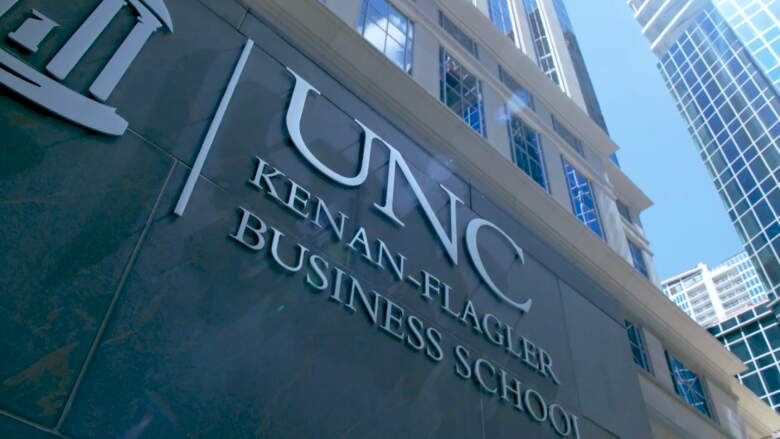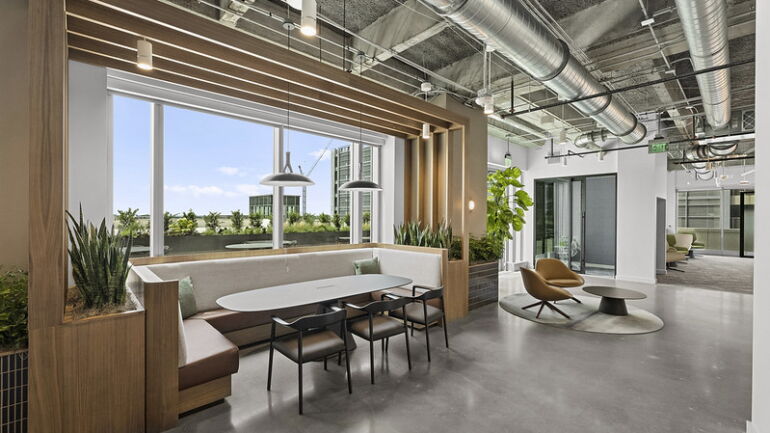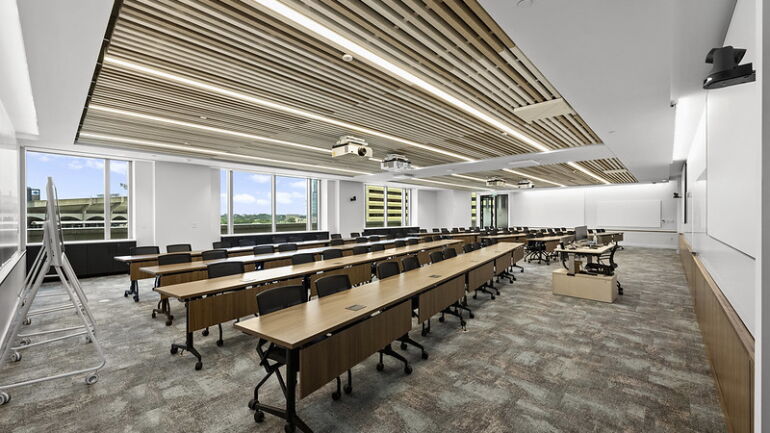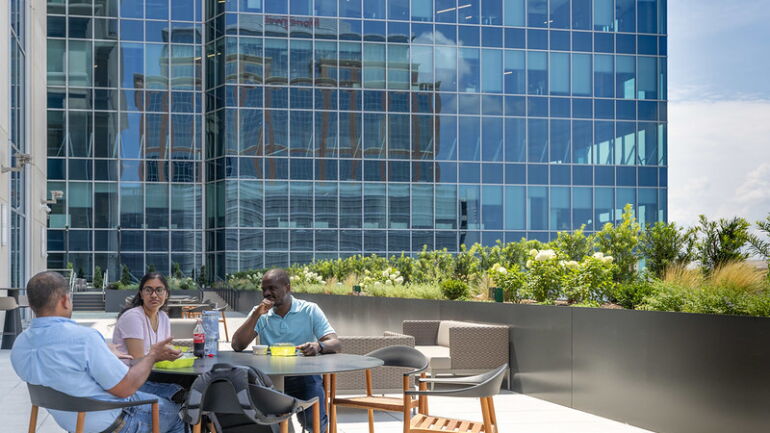News & Stories
Our new home in Charlotte
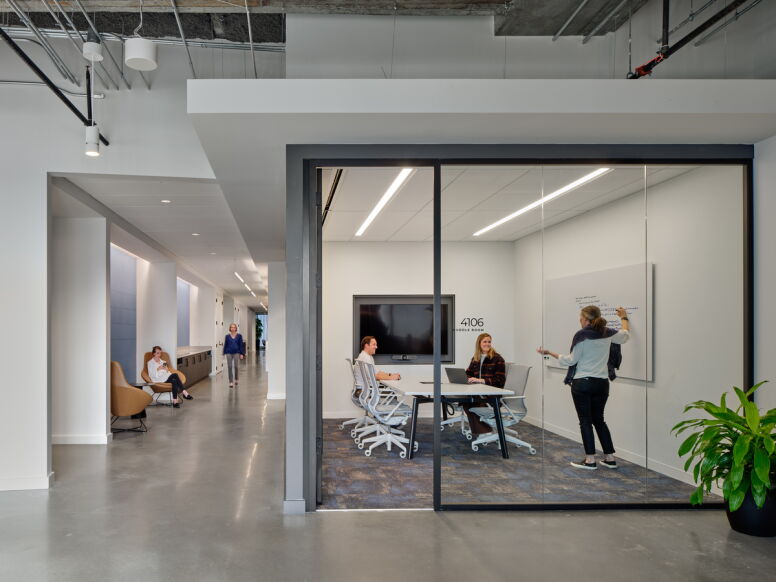
Charlotte has always held a special place in the hearts and minds of the UNC Kenan-Flagler Business School community.
Charlotte-area high school students have traveled to Chapel Hill to study business since the School’s founding in 1919, while working professionals have commuted from Charlotte to attend the Weekend Executive MBA Program in Chapel Hill since 1999.
Graduates return to Charlotte to work and start businesses, playing a vital role in the city’s rise to become a top U.S. financial center and one of the best places to start a small business. The city is now home to UNC Kenan-Flagler’s second largest alumni base – 5,700 and growing – with 44,500-plus graduates from UNC-Chapel Hill.
With such strong Tar Heel roots, the Charlotte business community had long advocated for UNC Kenan-Flagler to offer its top-ranked MBA program in the Queen City.
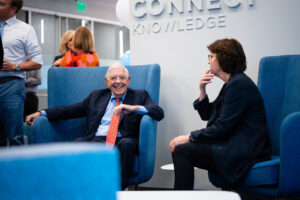 “I want this to happen because we have a great city attracting a lot of young people here who are doing well but want to go forward with their education,” Hugh McColl (BSBA ‘57), former chairman and CEO of Bank of America, told the Charlotte Business Journal in 2021. He said that Charlotte needed UNC Kenan-Flagler’s nationally recognized MBA program to be offered in Charlotte, too, to help develop its future leaders.
“I want this to happen because we have a great city attracting a lot of young people here who are doing well but want to go forward with their education,” Hugh McColl (BSBA ‘57), former chairman and CEO of Bank of America, told the Charlotte Business Journal in 2021. He said that Charlotte needed UNC Kenan-Flagler’s nationally recognized MBA program to be offered in Charlotte, too, to help develop its future leaders.
That wish became a reality when the Business School launched the Charlotte Executive MBA Program in 2022. Without commuting to Chapel Hill, more students can benefit from the exceptional quality of our MBA program, stellar faculty and dedicated staff at UNC Kenan-Flagler.
“We are excited about the successful launch of the new MBA program and the opening of our beautiful new campus in Charlotte,” says Dean Mary Margaret Frank (BSBA ’92, MAC ’92, PhD ’99). “They strengthen our commitment to making a UNC Kenan-Flagler education more accessible and help us achieve our mission to develop leaders who make the world a better place.”
Having a presence in the heart of North Carolina’s business capital is a win-win, says Frank. “The campus allows us to offer UNC Executive Development programs, increase partnerships with and make contributions to the Charlotte business community, connect more deeply with area alumni, and provide a new opportunity to collaborate with our colleagues at UNC Charlotte’s Belk College of Business and other local colleges and universities.”
The Charlotte Executive MBA is designed for working professionals who live close enough to the Charlotte metro to attend classes once a week. During the 24-month program, they attend in-person classes on Monday nights and some Friday afternoons when classes will include working lunch sessions with Charlotte business leaders and other expert speakers. It is a blended program, with classes divided between in-person and self-directed online coursework.
For the second entering class, the Class of 2025, their average age is 33 and they average 10 years of work experience. They represent 48 companies, 12% already have advanced degrees, and represent such industries as financial services, technology, consulting, manufacturing and energy.
Fortune calls Charlotte the “South’s capital of capital” in a 2019 article – a top banking center that has attracted major corporations, sparked startups across a variety of industries and boasts a thriving fintech sector. “The sum effect of all of this collaboration and advocacy has been an environment that – contrary to the cutthroat, dog-eat-dog world of entrepreneurship in other, larger markets – sees business leaders in Charlotte working together, to an almost unusual extent, toward a shared goal of success.”
“The Charlotte business community has embraced us,” says Frank. “They understand our interest in building meaningful partnerships since that is the way business is done in Charlotte – a commitment to both community and innovation.”
Location, location, location
The Business School’s first campus outside of Chapel Hill is in Legacy Union’s new Bank of America Tower on South Tryon Street.
Frank thinks of UNC Kenan-Flagler as one enterprise with two exceptional campuses. “The Charlotte campus is important to UNC Kenan-Flagler and gives an amazing location for convening alumni and other business leaders, operating a range of activities and hosting events, as well as offering our Charlotte Executive MBA Program.”
The new campus is stellar – in terms of both location and the quality of the space.
School leaders worked hard to find the right location for the space, says Dave Moore, director of facilities at UNC Kenan-Flagler. “It is just on the edge of downtown, next to the Bank of America Stadium. The location makes it easy for people who work downtown and commuters to reach our campus.” It provides proximity to transportation, including quick access to the interstate and is one block from the Stonewall Light Rail Station, and parking.
The 16,000 square-foot campus on the building’s fourth floor includes three spacious classrooms, a large outdoor terrace overlooking Charlotte’s South End, four breakout or “huddle” rooms for small-group discussions, several smaller rooms for private calls and meetings, and a large kitchen.
Open areas provide opportunities for networking. The terrace and glass walls ensure classrooms and smaller spaces are filled with natural light. “We wanted the open terrace, so students have exposure to the outside and have another space where they connect with each other during breaks,” says Moore. “Our vision is that the design of the campus would play a role in building a sense of community between students, faculty, staff and alumni.”
Designed for learning
The design of the Charlotte campus was informed by the expertise of the facilities and IT teams at UNC Kenan-Flagler. Learning, collaboration, teaching and technology considerations informed their work.
They focused on providing the best learning experiences possible – in person and online – with as much flexibility as possible – for teaching and interacting, whether in small groups or at a “fireside chat” event.
Moore describes the campus as casually elegant, “with design cues from mid-century modern architecture in terms of the furniture and the space’s quality and character. It’s high-tech with wide expanses of glass and metal, polished-concrete floors and exposed ductwork – combined with natural materials such as walnut and stone – that make it feel warm and very comfortable.”
The flat classrooms are a significant element of the design. They provide the flexibility to create different types and sizes of learning spaces. Two are divisible by a moveable wall, and tables can be arranged in multiple configurations.
“We are using design features that we are incorporating in the new Steven D. Bell Hall,” says Moore, who is leading its construction. “The classrooms are a prototype for the Bell Hall classrooms.”
“We’ve taken everything we’ve learned about technology in the McColl Building, everything we’ve learned at the Rizzo Center, and implemented it into the Charlotte classrooms,” says Steven Hallman, director of academic technologies at UNC Kenan-Flagler.
“The challenge,” he says, “was to make it very high-tech and informal so it’s conducive for students to talk with each other, especially in case-based and discussion-based classes.
There are two large projection screens in the front of the room, as well as two in the back. Any source can be sent to any projector, but they are especially useful to accommodate Zoom meetings and having remote participants always in view. Four AI cameras track who is speaking in the classrooms. They automatically zoom in wherever the sound comes from in the room, so students don’t have to use a microphone. Another camera captures the professor or speaker, who can walk around the room, pace or walk among the students. The camera automatically follows and focuses on them.
“And a third piece is that whatever is presented on projectors also gets recorded in a separate window,” says Hallman. “The cameras record everything that happens in class, so students can go back and review materials. They can choose which camera feed they want or have a full screen of the content – professor, student and projected material.”
Mics in the ceiling pick up everything so students in the classroom and on Zoom hear the discussion. Hearing assistance is provided. “If a student has hearing issues, there’s a little device they can use with their own headphones. We’re working to make it also available on their phones.”
The professor doesn’t have to “do” anything with the technology. It’s all in the background, pre-programmed and ready to go when the professor starts teaching and turns off when class ends.
Frank is impressed by the teams’ approach to creating environments that encourage curious and collaborative learners, a hallmark of the UNC Kenan-Flagler experience. “From my engagements with our alumni since my arrival, I have repeatedly heard that they value their experience because of the opportunities provided to grow their minds and network which have served them well and lasted a lifetime,” she says.
UNC Kenan-Flagler students are thrilled about the program and the campus.
“The people at UNC Kenan-Flagler are what makes it so special – the professors, the classmates, the administration,” says Myers McGarry (MBA ’24), associate broker at JLL. “There is an electricity around being part of the Chapel Hill community. In our first Executive Friday, Hugh McColl noted that for Charlotte to grow, we needed a top-20 program in the city. Mr. McColl challenged our class to not only be the first class, but the best class – he set the bar really high for us.”
In terms of her classmates, McGarry says the “55 amazing Charlotteans in our program are all committed to doing business in Charlotte. I think it’s going to be huge for Charlotte to have this committed group of people learning and growing the business community from Charlotte but through UNC Kenan-Flagler.”
